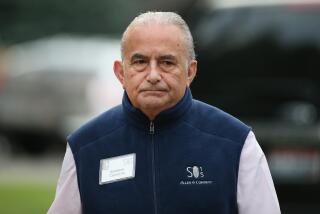Televisa Submits Revised Bid for TV Firm
- Share via
Capping a chaotic week, Los Angeles billionaire A. Jerrold Perenchio on Friday had a new bid in hand for Univision Communications Inc., even as another, earlier offer expired.
As expected, a group of investors led by Mexico’s broadcasting behemoth Grupo Televisa submitted a bid of about $36 a share, or at least $11.2 billion, shortly before midnight Thursday.
But in assembling that bid, Televisa went through more partners than the Lotharios who populate the company’s wildly popular telenovelas.
In a surprise development Friday, Venezuelan billionaire Gustavo Cisneros’ firm -- which is Univision’s largest shareholder and had been part of Televisa’s team for the last week -- revealed that it had exited the negotiations, at least for now, and was not part of the Televisa offer.
“This has been a very complex situation,” Antonieta Lopez, spokeswoman for Caracas-based Cisneros Group, said with a sigh. “We decided not to participate in this initial phase of the bidding process.”
That came on the heels of three major private equity firms’ departure from Televisa’s team earlier in the week: Kohlberg Kravis Roberts & Co., Blackstone Group and Carlyle Group.
Televisa’s equity partners in the bid now number just two: Microsoft Corp. Chairman Bill Gates’ Cascade Investment and Boston-based private equity firm Bain Capital.
Cisneros decided to part ways with Televisa just three hours before it made its bid late Thursday. That decision came after a tense night of discussions over who would control Univision, according to two sources close to the situation. Its move did not change the bid’s structure or financing. In fact, the bid contained bank letters to verify that it was fully financed and ready to go, according to three sources close to the team.
Now the 75-year-old Perenchio, who is known as a wily negotiator, is expected to try to get Televisa to come up on its price. He had initially hoped to get $40 a share for the company, but in light of recent increases in interest rates on high-yield bonds, the target price is now closer to $38 a share, according to a source with knowledge of the company’s strategy.
Meanwhile Friday, the group of investors whose Wednesday bid of $35.50 a share was the first on the table allowed its offer to expire. This group consists of media mogul Haim Saban, who made a fortune on the Mighty Morphin’ Power Rangers, and private equity firms Texas Pacific Group, Providence Equity Partners, Madison Dearborn Partners and Thomas H. Lee Partners.
According to one member of that group, the Saban-Texas Pacific team is waiting to see whether Perenchio will invite it back to make another offer.
Univision’s stock rose 15 cents to $32.95 on Friday -- still about 7% lower than when the week began. The company’s shares began to fall when it became clear that Perenchio had not orchestrated a fierce bidding war.
Perenchio, who has run Univision for 14 years, decided to put the company up for sale in February.
Televisa and its 38-year-old chairman, Emilio Azcarraga Jean, have long wanted a greater voice in the management of the largest Spanish-language media company in the U.S. It was Azcarraga’s grandfather who helped launch Univision 45 years ago, and Televisa programming continues to bring in about 40% of Univision’s ad revenue.
Televisa executives have long felt they got the short end of the stick in 1992 when Perenchio, Cisneros and Azcarraga’s father bought Univision from Hallmark Cards Inc. for $550 million.
Until recently, Televisa did not want Cisneros as part of its team, according to a source familiar with Televisa’s thinking. That’s because Televisa wants to own as big a stake in Univision as possible. Federal rules prevent foreign citizens from controlling more than 25% of a U.S. broadcasting company, and Televisa wants to own that entire chunk, not split it with another foreign entity.
If Cisneros had been part of the bid with his 14% stake, Televisa would have been limited to its current 11%.
Televisa didn’t need Cisneros’ money. The Mexico City-based company has about $1 billion in cash on hand. Still, Televisa allowed Cisneros to join the team last week when it appeared that Perenchio preferred the rival Saban team. Televisa thought that it might need Cisneros to try to block the sale to another group.
Univision’s bylaws contain a provision that allows Cisneros and Televisa’s Azcarraga to band together to veto a sale of the company’s assets, which would require more than a 60% vote of all shareholders to approve. If that were to happen, the two Latin Americans could override Perenchio.
But by Thursday night, when it appeared that the Saban group was losing steam, Cisneros’ value to Televisa began to wane.
It is not clear why the three private equity firms got cold feet. Sources say they left because of a dispute over how much Televisa should bid. Televisa wanted to put in a big enough initial offer to clinch the deal, one source said.
Not only that, but major media companies that own English-language networks began making noise about possible conflicts of interest. The three private equity firms also were part of a consortium that last month bought Dutch media company VNU, which owns the U.S. television ratings firm Nielsen Media Research.
Nielsen is the sole firm that measures television audiences in the U.S. Some have questioned the appropriateness of having one group of investors own both the ratings company and some of the TV networks it measures.
More to Read
Sign up for Essential California
The most important California stories and recommendations in your inbox every morning.
You may occasionally receive promotional content from the Los Angeles Times.














